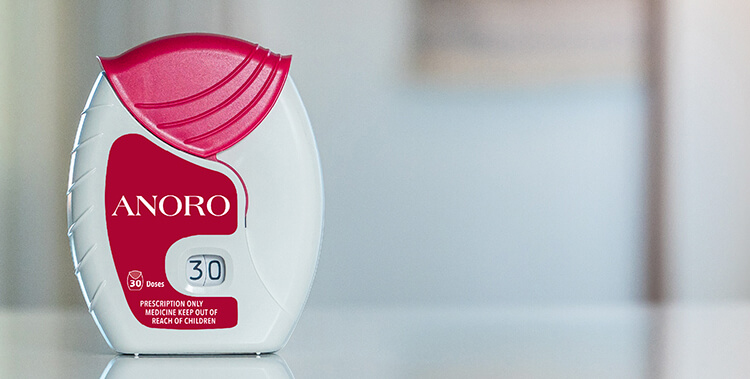Anoro is a once-daily treatment for people living with Chronic Obstructive Pulmonary Disease, or COPD.3
Just a single puff, every day, may help you breathe easier.1,3
ANORO is a combination of 2 medicines that work together to help you breathe better all day and night.1,3
-
Anoro contains 2 medicines called bronchodilators that
work together to relax smooth muscles around your airways
and open air passages in your lungs, making it easier to
breathe in and out.1,3
- One medicine (umeclidinium) blocks tightening of smooth muscles around your airways
- One medicine (vilanterol) opens airways by relaxing muscles around the airways in your lungs
The result: opening the airways in your lungs to help you breathe easier.1,3

When should I talk to my doctor about my COPD?
If you are regularly using a puffer for your COPD and still experiencing any of the following4,5:
- Wheezing
- Repetitive Cough
- Chest Tightness
- Shortness of Breath
- Phlegm / Mucus


It's always a good time to talk to your doctor
Talking to your doctor about your COPD and the puffer(s) you use is important to ensure you manage your symptoms well. Use these questions as a guide and ask your doctor if Anoro is right for you.
Questions to ask your doctor:
- I get breathless every day. Is that normal?
- How can I keep doing the activities that I enjoy (e.g gardening, going for walks)?
- What are some of the signs that my COPD could be getting worse?
- Am I using my puffer correctly?
- Would a once-daily puffer help my COPD?
IMPORTANT SAFETY INFORMATION1,3: Don't use Anoro if you are allergic (hypersensitive) to any of the ingredients contained in Anoro. Like all medicines, Anoro Ellipta can cause side effects, although not everybody gets them. Common side effects, which may affect up to one in ten people, include sore throat with or without runny nose, cough, constipation, dry mouth, painful and frequent urination (which may be signs of a urinary tract infection), feeling of pressure or pain in the cheeks and forehead (which may be signs of inflammation of the sinuses called sinusitis), pain and irritation in the back of the mouth and throat, and infection of the upper airways. If you think you are having an allergic reaction to Anoro, stop using this medicine and tell your doctor immediately.
Any information provided on this website should be discussed with a healthcare professional and does not replace a healthcare professional’s advice.
Clicking on the above links will lead you to a third-party website, and GSK is not responsible for the content of that website. By clicking on the COPD Assessment Test link, you are leaving a GSK New Zealand website to a non-branded, international website developed by GSK.







.png)


